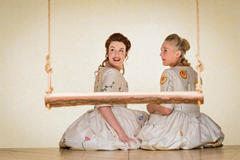| Opera Reviews | 4 May 2024 |
A warm-hearted Così fan tutteby Catriona Graham |
|
| Mozart: Così fan tutte English Touring Opera Perth Festival of the Arts May 2013 |
|
|
In Martin Fitzgerald's reasonably witty English translation, this production goes for the double standard. While Dorabella and, particularly, Fiordiligi agonise over being unfaithful and flirting with other men, their beaux have no scruples about infidelity. Conductor James Burton seems to take it at a cracking pace - at least, there are none of the 'do get on with it' longeurs I recall from other productions, for example in the poison-taking scene. Lorna Bridge, singing Fiordiligi at short notice 'on Lemsip and adrenalin', was clearly suffering, yet turned in a very creditable performance. Her aria "Come scoglio" is sung with lightness, whereas the emotional turmoil of "Per pieta, ben mio, perdona" when the stage is bathed in a rosy glow, is intense. Designer Samal Blak has chosen a creamy, uncluttered, minimalist set which evokes rather than reproduces the 18th century. The girls are in white with embroidered motifs, Despina in covetable turquoise-green satin. The beaux wear cream with black facings, then black gowns with cream trimmings as 'Albanians'. They also sport wonderful sparkly, curly-toed slippers. The early trio "Soave sia il vento" may be one of Mozart's greatest hits; here it is sung fervently, with sweet sincerity. Thereafter, Kitty Whately's Dorabella is seriously bored, big-time, remarkably soon. The robuster of the sisters in any case, she romps around the stage - "Una donna a quindici anni", after all; too easily we forget just how young opera heroines are, since the parts are usually sung by women old enough to be their mothers. Ferrando (Anthony Gregory) is, perhaps, the more fervent, excitable of the two beaux - his enthusiastic aria "Un'auro amorosa", responding to "Come scoglio", is deliciously sung with model enunciation. Toby Girling's Guglielmo is, if anything, a tad smug - till, of course, his Fiordiligi succumbs to Ferrando's importuning. Their clowning as Albanians is enough to be amusing but thankfully stops well short of the tedious. Paula Sides is an ebullient Despina, happy to encourage the girls to play the field and to conspire with Don Alfonso. Her Act 2 aria "Una donna a quindici anni" is impishly sung. Her impersonations of doctors and lawyers are full of mischief. However, when the denouement comes, she is visibly hacked off with being set up by Don Alfonso and not being quite so bright and worldly-wise as she had thought. Richard Mosley-Evans is a philosophical Don Alfonso, warm and humorous, rather than malicious in his testing of the lovers. This is a warmhearted production, whatever it may say about darkness in Edward Said's essay quoted in the programme notes. |
|
| Text ©
Catriona Graham Photo © Robert Workman |

 After the serious politics, ETO rewards us with the froth, in an exuberant
performance of Mozart and da Ponte's last collaboration, Così
fan tutte.
After the serious politics, ETO rewards us with the froth, in an exuberant
performance of Mozart and da Ponte's last collaboration, Così
fan tutte. 





